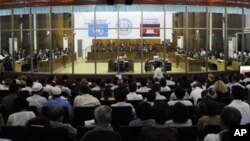International judges for the Khmer Rouge tribunal on Monday urged independence and impartiality for the UN-backed court, as a full meeting of judges opened.
The 9th plenary session, in which all the international and national judges and prosecutors meet to guide the tribunal, opened with the court facing a daunting trial ahead for four Khmer Rouge leaders.
“A court can be regarded as a success only if it meets certain criteria, including that it conducts fair, transparent and expeditious trials,” judge Sylvia Cartwright said ahead of Monday’s session. “And in keeping with legal principles, and that its judges are independent and impartial.”
Court officials are expected to discuss internal rules for the tribunal over the next three days that will help it bring Case 002—of Nuon Chea, Khieu Samphan, Ieng Sary and Ieng Thirith—to trial for atrocity crimes, including genocide.
Cartwright said the conduct of trials at the court can serve as an aid to develop both international criminal law and assist domestic courts.
The tribunal has borne criticism over government involvement, with Prime Minister Hun Sen claiming there will be no further trials despite a list of indictable suspects for at least two more cases.
And defense lawyers have made motions to disqualify the head of the Trial Chamber, judge Nil Nonn, accusing him of corruption when he was a judge at Battambang provincial court, and four other judges for bias.
Part of the plenary session will be a substitute panel of judges to consider that motion, said judge Kong Srim, who is heading this week’s meeting.
Kong Srim also said Monday the tribunal expects to publicly announce a final decision in June for the court’s first case, against torture chief Duch, after the Supreme Court decides in March.




